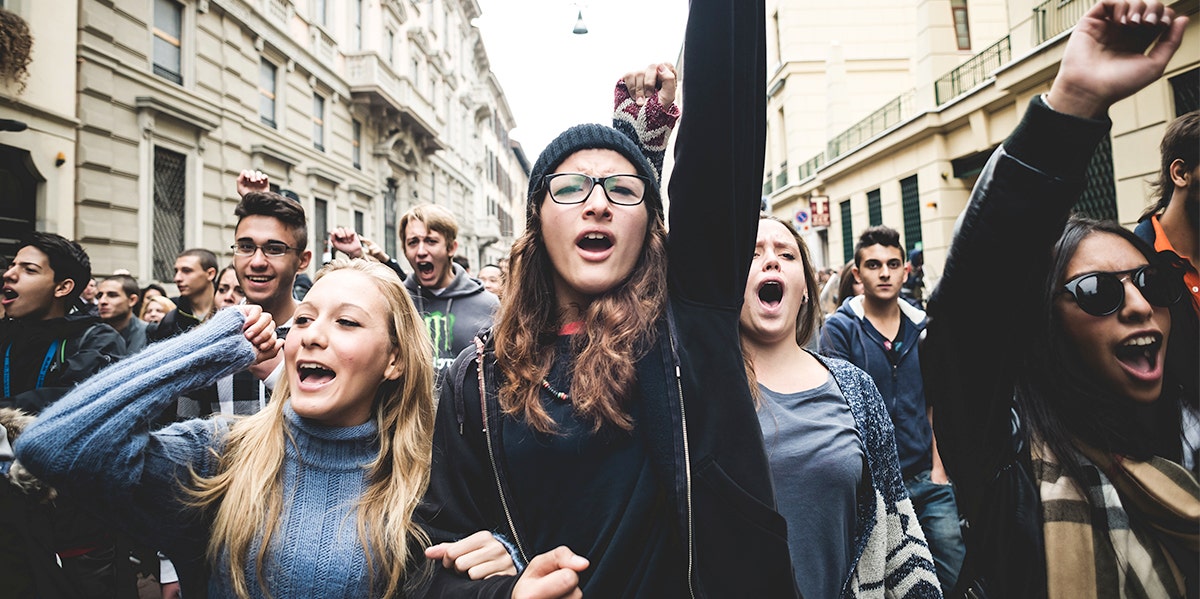How To Be An Active Member In A Social Movement Without Harming Your Mental Health
Taking care of yourself should always be a priority.
 Eugenio Marongiu / Shutterstock
Eugenio Marongiu / Shutterstock Over the past year, people all over the world have started coming together in the face of injustice. Whether it’s racial issues, gender and sexuaility, or women’s reproductive rights.
Trying to sustain long-term activism can be extremely detrimental to one’s mental health. In the age of protests, some people do not have the physical or mental capacity to be involved in marches.
As someone who constantly writes and talks about social justice movements in my everyday life, it can become overwhelming, as I’m sure many people in our population can relate to. Often, it can be hard to draw a line for yourself while still trying to be an active member in the current social climate.
But, there are definitely ways in which you can continue to inspire change within different communities around the country without losing your sanity.
Being a good ally means consistently and actively educating yourself on issues you feel passionate about. For me, during the Black Lives Matter protests that occurred during the summer of 2020, I spent a lot of time off my phone because social media was becoming harmful to my own mental health.
In the interim, I spent much of my time watching movies, reading books, and listening to podcasts that would stimulate my mind in a way that I could still be an active member in the fight for Black equality.
It’s important to understand why certain issues are being talked about, and why people are out on the streets protesting and demanding change. But something that's much more important than education is unlearning.
Unlearning means sitting with yourself as you confront your own internalized racism, misogyny, homophobia, transphobia, xenophobia, and any other forms of bigotry. It’s confronting your own biases that perpetuate many of the dangerous stereotypes that cause harm to marginalized communities.
You can also use social media to educate yourself. Many people regard social media activism as somehow "less than" in-person activism but in reality, it's a perfect way to continue educating yourself and have or observe conservations that can add to your knowledge.
In the age of socially-distanced living, getting behind a screen and starting stimulating and effective conversations with people you follow — even if you're just following along, rather than engaging — is a great way to learn.
Social media activism also doesn’t require you to go out and actively protest, and you can easily control what you see and how much information you take in. Of course, not everything on social media is inherently accurate, which is why it’s important to fact-check, and follow up with academic sources afterward. A discerning eye is key on social media to make sure you're digesting accurate and unbiased information. Here's a helpful media bias chart.
It also helps to follow a plethora of social media advocates, activists, and people who are educated on issues that matter to you. I started following many different Black Lives Matter organizers and activists who share different infographics and information that's helpful to me and to the movement. Some recommendations include Ijeoma Oluo, Patrisse Cullors-Brignac, and Marie Beecham.
You can also get involved with activist groups and organizations. There's always an influx of different non-profit groups supporting a cause that matters to you. Some groups I'm passionate bout include The Bail Project, Black Lives Matter Global Network, and the Black Trans Advocacy Coalition.
Even just donating five dollars can make a difference. It doesn’t always have to be some grand gesture; even the smallest contribution can help a lot in the long run.
If you’re low on cash, submit an inquiry about volunteer work. Non-profit organizations are always looking for people to help out to plan events and get the word out about what they do on social media.
Volunteering is something you can do while still being an ally to marginalized communities. It doesn’t require having to go out and protest, and you can still feel fulfilled in your activism and advocacy work.
Remember: we're all human beings and it can become overwhelming to try and carry all of the world’s issues on our backs. Take some time for yourself to look over your mental health and make sure you’re in the right headspace to help others.
Nia Tipton is a writer living in Chicago. She covers pop culture, social justice issues, and trending topics. Follow her on Instagram.

